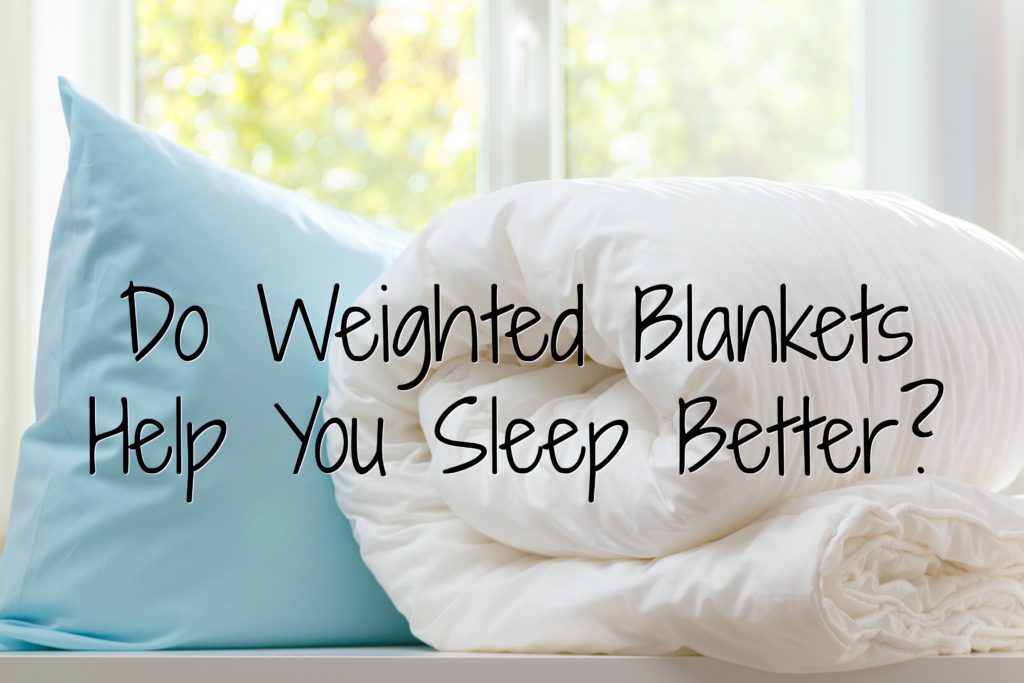By Lauri Leadley

Lauri Leadley, Clinical Sleep Educator, President of Valley Sleep Center
In recent years, weighted blankets have started to be marketed as a sleep aid for people with anxiety, autism, insomnia and other conditions that make sleeping difficult. But, do they work?
What are the Benefits of Using a Weighted Blanket?
A weighted blanket can help both children and adults reach a more relaxed state and allow them to sleep more deeply. They usually weigh between five to 30 pounds and create a type of therapeutic pressure that mimics deep pressure stimulation.
Deep pressure stimulation is a type of therapy that utilizes hands-on pressure techniques to relax a person’s nervous system. (1) Weighted blankets mimic this hands-on pressure when they are swaddled around the body.
Weighted blankets also help to “ground” your body while you sleep by applying downward pressure. This is often referred to as “grounding” and has a very calming effect.
A 2004 study shows that grounding helps to reduce the levels of the stress hormone cortisol that your body produces at night. (2) Your brain produces cortisol when it thinks that you are under attack, evoking the “fight or flight response.” Stress is known to elevate cortisol levels which can harm your immune system, blood sugar levels, digestive tract, and sleep patterns/quality.
When cortisol levels are elevated and don’t naturally drop back down to normal levels, it can cause several complications, including:
- Anxiety
- Chronic Pain
- Depression
- Insomnia
- Weight gain
The 2004 study reported that using grounding techniques while sleeping is an effective way to match cortisol secretion with the natural 24-hour circadian rhythms. Participants of this study found that grounding helped to reduce their cortisol production during sleep, improving their sleep quality as well as alleviating stress, insomnia, and pain. This was especially true for women. (2)
Additionally, the deep pressure touch therapy weighted blankets provide can promote relaxation and help to break the excess cortisol production cycle. Deep pressure touch therapy triggers the release of dopamine and serotonin, feel-good hormones produced by the brain. These hormones are known to help fight anxiety, depression, and stress. (3)

Who Benefits from Using a Weighted Blanket?
Weighted blankets have been studied for effectiveness for many conditions. While more studies are needed, previous results have been promising for people in the following scenarios:
Autism
Trouble sleeping is a common symptom of autism, especially for children. In a 2014 study, researchers looked at how effective weighted blankets were for sleep issues in children with autism. (4) The results of the study show that there was little change in sleep scores.
However, despite the lack of limited improvement in sleep scores, both the parents and children preferred sleeping with the weighted blanket. This finding is supported by a study performed in 2017 that identified the benefits of deep pressure therapy in some people with autism. (5)
Anxiety
The treatment of anxiety is one of the initial uses of weighted blankets. Studies show that the deep pressure stimulation provided by weighted blankets reduces autonomic arousal. (6) Autonomic arousal causes many of the symptoms of anxiety.
This research was performed on 32 adults using 30-lb weighted blankets and concluded that of these adults, 63 percent felt that when they used a weighted blanket their anxiety was reduced. (6)
Insomnia and Sleep Disorders
In the studies above, participants all felt that the weighted blankets were beneficial in reducing sleep issues including reducing the amount of times they woke at night. (4,5,6) However, research on the use of weighted blankets as an effective treatment for insomnia and other sleep disorders is sparse and conflicting.
While findings suggest that the blanket will help people feel more relaxed, therefore helping them sleep better, there is no evidence that they will help with the treatment or curing of sleep disorders. In other words, currently, research suggests that weighted blankets may help you to sleep better once you’ve fallen asleep, but they will not prevent insomnia and other disorders.
Medical Procedures
Studies suggest there may be some benefits to using weighted blankets during medical procedures. Medical procedures can cause anxiety in patients and using a weighted blanket during these procedures may help to calm those symptoms.
In 2016, a study used weighted blankets on people who were having their wisdom teeth removed. The participants who used the weighted blankets were said to have lower anxiety levels than those who did not. (7) A 2019 follow-up study performed on adolescents undergoing molar extraction also found that anxiety was reduced when a weighted blanket was used. (8)
Are There Any Risks to Using a Weighted Blanket?
For the most part, using a weighted blanket is safe. Manufacturers, however, suggest that they not be used on children ages two and under for risk of suffocation. It is probably best to consult with a pediatrician before using a weighted blanket on any child.
Weighted blankets are also not ideal for people with the following conditions as they could exacerbate their symptoms:
- Asthma
- Claustrophobia
- Obstructive Sleep Apnea (OSA)
How to Choose the Best Weight
There are two general rules when selecting a weighted blanket. 1.) It is between five and 10 percent of your body weight. 2.) It fits snuggly to your bed. Most manufacturers offer these suggestions:
- Children between 20 and 70 pounds should use a small blanket that is between three and eight pounds.
- Children between 30 and 130 pounds can use a medium blanket that is between five and 15 pounds.
- Adults can use medium or large blankets that are between 12 and 30 pounds.
- Elderly adults should opt for a small or medium blanket that is between five and eight pounds.
Where Can You Find Weighted Blankets?
As they grow in popularity, weighted blankets are becoming more available and are sold at places like Amazon, Target, and Walmart.
Some companies that specialize in weighted blankets include:
- Gravity. In 2019, Gravity was awarded the top-rated weighted blanket award by Mattress Advisor. Their prices start at around $250.
- Layla. Layla is a company that specializes in pillows and mattresses, but they also make a weighted blanket that starts at around $130.
- Mosaic. Mosaic has a full line of weighted blankets in a variety of colors for all ages. They start at around $125.
- SensaCalm. SensaCalm has both premade and custom weighted blankets that start at around $100.
Studies on weighted blankets have shown some positive results in helping to treat symptoms of various conditions including autism and anxiety. While more research is needed to determine if they can aid in the treatment of insomnia and other sleep disorders, they have proven to help relax a restless body and ease an anxious mind, thus improving sleep quality.
For more, check out this video spot on FOX10 Phoenix —
Valley Sleep Center – We Can Help You Sleep Better!
If you have trouble sleeping at night or think you might suffer from a sleep disorder. contact us at Valley Sleep Center for accurate analysis and treatment options.
- What is Deep Pressure Stimulation?, AppliedBehaviorAnalysisEdu.org
- Ghaly M (2004), The biologic effects of grounding the human body during sleep as measured by cortisol levels and subjective reporting of sleep, pain, and stress, US National Library of Medicine, National Institutes of Health
- Annamarya Scaccia (2017), Serotonin: What You Need to Know, Healthline
- Paul Gringras (2014), Weighted Blankets and Sleep in Autistic Children—A Randomized Controlled Trial, Official Journal of the American Academy of Pediatrics
- Lana Bestbier and Tim I. Williams (2017), The Immediate Effects of Deep Pressure on Young People with Autism and Severe Intellectual Difficulties: Demonstrating Individual Differences, U.S. National Institutes of Health’s National Library of Medicine (NIH/NLM)
- Brian Mullen, BS (2008), Exploring the Safety and Therapeutic Effects of Deep Pressure Stimulation Using a Weighted Blanket, Researchgate.net
- Hsin-Yung Chen (2016), Effect of deep pressure input on parasympathetic system in patients with wisdom tooth surgery, ScienceDirect.com
- Hsin-Yung Chen (2019), Parasympathetic effect of deep pressure input on third molar extraction in adolescents, ScienceDirect.com

